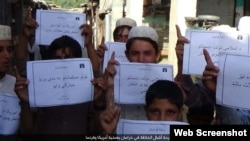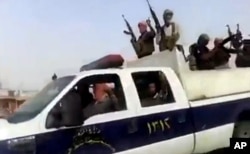Nearly eight months after overhauling its strategy to curtail the Islamic State terror group's success in cyberspace, U.S. officials admit it is hard to know if they are making much headway.
"This arguably is the most complex challenge that the federal government and industry face," said George Selim, director of the office for community partnerships at the Department of Homeland Security. "There's not an overarching measure."
The new approach laid out in January shifted some of the focus away from government-led efforts to counter IS and placed greater emphasis on working with communities and local organizations. The goal was to find and amplify voices that might better resonate with young people at risk of being sucked in by IS propaganda.
While several studies are underway hoping to gauge the impact these efforts are having, Selim said Friday at the Aspen Security Forum that one thing has not changed.
"The number one threat to the homeland is [Islamic State's] ability to recruit and radicalize," he told an audience in Aspen, Colorado.
The lack of progress in efforts to counter online efforts by Islamic State contrasts with successes by U.S. and coalition forces on the battlefield in Iraq and Syria, where the terror group has lost control of almost 50 percent of the territory it once held in its self-declared "caliphate."
No ripple effect
Many U.S. officials had hoped those gains on the ground would have a ripple effect, building skepticism about IS social media boasts among would-be jihadists. So far, that has not happened.
The House Foreign Affairs Committee chairman, Representative Ed Royce, worries that counter-IS efforts will not be successful as long as the extremists "can point to an existing concept of a 'caliphate.' "
"Those ideas are in the pipeline, and they're being spread all over, from Indonesia to West Africa," the California Republican said at the Aspen forum. "That makes it very, very credible that this could be the future."
Researchers say there are other reasons that Islamic State's military reverses are not having more of an impact.
"You can't bomb the American kids who are finding a way to turn themselves into heroes by killing people in ISIS's name," said Jessica Stern, a fellow at the FXB Center for Health and Human Rights at the Harvard School of Public Health and co-author of ISIS: The State of Terror. ISIS is an acronym for Islamic State.
Stern said studies have shown risk factors for radicalization among Western youth often have more to do with feelings of alienation, from country and community. Researchers who followed Somali refugees targeted by Islamist extremists showed clearly that "time on the internet is a risk factor," she added.
Power of propaganda
Despite social media operators' efforts to block terrorists from influencing their networks, each new terror attack spawns more chatter, more imagery and more propaganda. Facebook and Twitter have been criticized for not doing more, and some U.S. lawmakers have urged them to implement automated technologies to identify extremist content much more quickly.
"We do see people praising attackers. We do see them praising ... extremist ideology," said Monika Bickert, Facebook's head of global policy management.
Removing such content is a challenge, since Facebook has about 1.6 billion user accounts, she says, and "even if Facebook and Google and Twitter were perfect at removing this content ... immediately, you have literally thousands of websites, gaming platforms, messaging services" that can distribute similar material.
The Facebook executive says racing to "scrub" that type of material from public view on social media can backfire in the long run. "When you do take down that content at the very initial stage, when somebody's interacting with it, then you do lose that ability to see the rest of that escalation," Bickert noted.
Officials at the Department of Homeland Security hope to gain new funding to allow them to hone their efforts. DHS has requested an additional $20 million for fiscal 2017, which begins October 1, split between a $10 million grant program and funding for community partnerships and for research, training and analysis.
"Compared with the amount of money we spend trying to take out the bad guys, kinetic operations, this is a drop in the bucket," said Harvard's Stern. "It's nothing."







